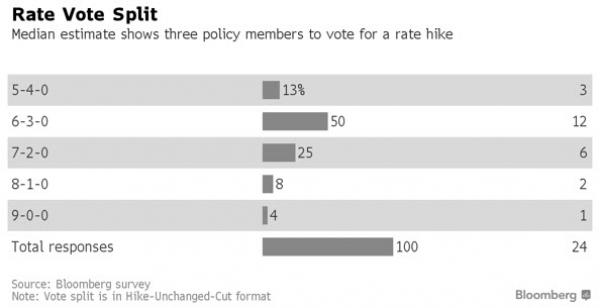The last time the Bank of England raised rates was July 2007, when rates increased to 5.75%. Credit markets began to dislocate a month later (when LIBOR diverged from Fed Funds), equity markets peaked three months after the increase and things eventually got much worse.
So, the track record is not auspicious, but the alleged global macro narrative this time is one of synchronised global growth, notwithstanding Catalonia, North Korea and embryonic concerns about Chinese deleveraging. On the domestic front, UK inflation is a bit too warm, growth a bit too tepid and Brexit a bit too uncertain.
Nonetheless, the BoE is expected to vote 6-3 in favour of a rate hike from 0.25% to 0.50% on Thursday, as Bloomberg reports, not everyone at the Bank of England will be on board with raising interest rates.
While Nov. 2 may see the U.K.’s first rate increase in more than a decade, economists surveyed by Bloomberg say three out of nine officials on the Monetary Policy Committee will vote against the move. That’s based on the median estimate from 24 responses. Any divide within the BOE panel reflects the conflicting signals from the economy, which is seeing both a currency-driven inflation surge and weaker expansion. While for some officials, the economy may still be too fragile to endure a rate increase, Governor Mark Carney and others see Brexit reducing potential output, making the U.K. more vulnerable to overheating.

Two of the three likely dissenters are two of the three deputy governors no less, as Bloomberg notes…
Policy makers Dave Ramsden and Jon Cunliffe may be among those to dissent. Ramsden said this month he doesn’t yet see domestic inflationary pressures building, and Cunliffe said it’s an “open question” when the BOE should lift its benchmark rate from a record-low 0.25 percent.
Silvana Tenreyro, described as “neutral” on policy by Bloomberg Economics, has also hinted that she’ll proceed with caution. The overriding thinking on the committee, however, seems to be that above-target inflation and a shock to supply from leaving the European Union means a rate hike is warranted.
In the build-up to the decision on Thursday, some recent data may have emboldened the more hawkish policy makers. The economy expanded by 0.4 percent in the third quarter, more than economists expected, and inflation hit 3 percent last month, a full percentage point above the BOE’s target. The central bank will update its economic forecasts alongside the policy decision. Compared with August, economists see a chance of an increase in the bank’s inflation estimate for this year.













Leave A Comment